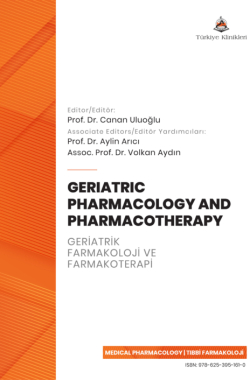Use and Potential Risks of Herbal Products & Supplements in the Elderly
Halit Güner ORHANa , Ş. Remzi ERDEMa
aBaşkent University Faculty of Medicine, Department of Medical Pharmacology, Ankara, Türkiye
Orhan HG, Erdem ŞR. Use and potential risks of herbal products & supplements in the elderly. In: Uluoğlu C, ed. Geriatric Pharmacology and Pharmacotherapy. 1st ed. Ankara: Türkiye Klinikleri; 2023. p.31-5.
ABSTRACT
Herbal products and dietary supplements are becoming popular, particularly among the elderly population. Unlike drugs, herbal products and dietary supplements are not subject to a detailed assessment process. Besides, they are not standardized in terms of contents, amounts, quality, and contamination risk, making them prone to pharmacokinetic and pharmacodynamic interactions with drugs. The use of herbal products and dietary supplements varies across countries due to differences in access to health services and medical traditions. This leads to different risks and clinical presentations of herbal-drug interactions. Many herbal products act as inducers or inhibitors for cytochrome P450 enzymes and cellular transporters and bear the risk of interactions with anticoagulants, antivirals, antihypertensives, antidiabetics, and antineoplastics whose metabolism is dependent on these mechanisms. For this reason, clinicians should be aware of the risks of herbal-drug interactions and protect geriatric patients from adverse reactions that may lead to serious clinical outcomes.
Keywords: Herb-drug interactions; herbal medicine; dietary supplements; geriatric
Kaynak Göster
Referanslar
- Kohn OF, Lew SQ, Wong SS, Sam R, Chen HC, Raimann JG, et al. Using herbs medically without knowing their composition: are we playing Russian roulette? Curr Med Res Opin. 2022;38(5):847-52. [Crossref] [PubMed]
- Souza-Peres JV, Flores K, Umloff B, Heinan M, Herscu P, Babos MB. Everyday Evaluation of Herb/Dietary Supplement-Drug Interaction: A Pilot Study. Medicines (Basel). 2023;10(3):20. [Crossref] [PubMed] [PMC]
- Gurley BJ, Yates CR, Markowitz JS. "…Not Intended to Diagnose, Treat, Cure or Prevent Any Disease." 25 Years of Botanical Dietary Supplement Research and the Lessons Learned. Clin Pharmacol Ther. 2018;104(3):470-83. [Crossref] [PubMed]
- Fears R, Griffin GE, Larhammar D, Ter Meulen V, van der Meer JWM. Globalization of Traditional Chinese Medicine: what are the issues for ensuring evidence-based diagnosis and therapy? J Intern Med. 2020;287(2):210-3. [Crossref] [PubMed]
- Izzo AA, Hoon-Kim S, Radhakrishnan R, Williamson EM. A Critical Approach to Evaluating Clinical Efficacy, Adverse Events and Drug Interactions of Herbal Remedies. Phytother Res. 2016;30(5):691-700. [Crossref] [PubMed]
- Agbabiaka TB, Wider B, Watson LK, Goodman C. Concurrent Use of Prescription Drugs and Herbal Medicinal Products in Older Adults: A Systematic Review. Drugs Aging. 2017;34(12):891-905. [Crossref] [PubMed] [PMC]
- Choudhury A, Singh PA, Bajwa N, Dash S, Bisht P. Pharmacovigilance of herbal medicines: Concerns and future prospects. J Ethnopharmacol. 2023;309:116383. [Crossref] [PubMed]
- Rashrash M, Schommer JC, Brown LM. Prevalence and Predictors of Herbal Medicine Use Among Adults in the United States. J Patient Exp. 2017;4(3):108-13. [Crossref] [PubMed] [PMC]
- Erdem SR. The effect of age-related pharmacokinetic and pharmacodynamic alterations on drug response: cardiovascular drugs and aging. Türkiye Klinikleri J Cardiol-Special Topics. 2013;6(1):14-22.
- Taneri PE, Akis N, Karaalp A. Herbal product use patterns and possible herb-drug interactions among older adults in Turkey. J Herb Med. 2021;29:100487. [Crossref]
- Asher GN, Corbett AH, Hawke RL. Common Herbal Dietary Supplement-Drug Interactions. Am Fam Physician. 2017;96(2):101-7.
- Sharma AK, Kapoor VK, Kaur G. Herb-drug interactions: a mechanistic approach. Drug Chem Toxicol. 2022;45(2):594-603. [Crossref] [PubMed]
- Hunter J, Harnett JE. Interactions between complementary medicines and drugs used in primary care and oral COVID-19 antiviral drugs. Aust J Gen Pract. 2023;52(6):345-57. [Crossref] [PubMed]
- Jalloh MA, Gregory PJ, Hein D, Risoldi Cochrane Z, Rodriguez A. Dietary supplement interactions with antiretrovirals: a systematic review. Int J STD AIDS. 2017;28(1):4-15. [Crossref] [PubMed]
- Nicolussi S, Drewe J, Butterweck V, Meyer Zu Schwabedissen HE. Clinical relevance of St. John's wort drug interactions revisited. Br J Pharmacol. 2020;177(6):1212-26. [Crossref] [PubMed] [PMC]
- Ramanathan MR, Penzak SR. Pharmacokinetic Drug Interactions with Panax ginseng. Eur J Drug Metab Pharmacokinet. 2017;42(4):545-57. [Crossref] [PubMed]
- Colalto C. Herbal interactions on absorption of drugs: Mechanisms of action and clinical risk assessment. Pharmacol Res. 2010;62(3):207-27. [Crossref] [PubMed]
- Jiang X, Williams KM, Liauw WS, Ammit AJ, Roufogalis BD, Duke CC, et al. Effect of ginkgo and ginger on the pharmacokinetics and pharmacodynamics of warfarin in healthy subjects. Br J Clin Pharmacol. 2005;59(4):425-32. [Crossref] [PubMed] [PMC]
- Turkmenoglu FP, Kutsal YG, Dolgun AB, Diker Y, Baydar T. Evaluation of herbal product use and possible herb-drug interactions in Turkish elderly. Complement Ther Clin Pract. 2016;23:46-51. [Crossref] [PubMed]
- Unsal O, Sütcüoğlu O, Yazıcı O. Dangerous interaction of bitter melon (Momordica charantia) with pazopanib: A case of acute pancreatitis. J Oncol Pharm Pract. 2022;28(2):486-8. [Crossref] [PubMed]
- Mashayekhi-Sardoo H, Mashayekhi-Sardoo A, Roufogalis BD, Jamialahmadi T, Sahebkar A. Impact of Curcumin on Microsomal Enzyme Activities: Drug Interaction and Chemopreventive Studies. Curr Med Chem. 2021;28(34):7122-40. [Crossref] [PubMed]

